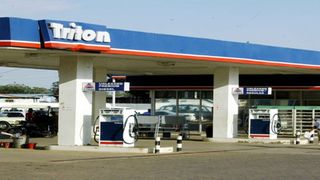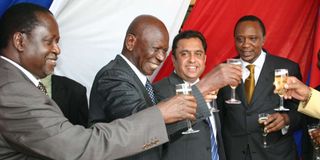
A Triton filling station near the Municipal Bus Park in Kisumu in this photo taken in January 2009.
| File | Nation Media GroupBusiness
Premium
Crashing oil prices laid bare Devani’s devious schemes
What you need to know:
- State-owned electricity generator KenGen was running out of fuel to power its diesel generators.
- The crisis that would eventually blow up three months later had been brewing since December 2004.
As ships docked, unloaded their cargo and left at the busy Kilindini Harbour in Mombasa, three vessels carrying crucial cargo remained berthed in the Indian Ocean waters for months – from the beginning of August 2008.
Global crude oil prices were finally tumbling after four years of climbing steadily, but that was not the reason Ms Avax, Overseas Primer and Tom Kansas were finding it difficult to offload their petroleum products.
Inside the belly of Tom Kansas, which docked at the Mombasa port on August 30, 2008 were 13.2 million litres of diesel. Ms Avax, which docked on October 30, 2008, was carrying 19.2 million litres of diesel while Overseas Primer, which arrived at the end of September, had 30 million litres.
Unknown to the seafarers aboard the three ships, who had been denied permission to offload their cargo, a serious crisis was brewing more than 400km inland – in Nairobi.
The crisis had everything to do with the cargo they were carrying, which the shipping companies they worked for had played no role in creating.
State-owned electricity generator KenGen was running out of fuel to power its diesel generators.
Total, which had been contracted to supply the fuel, was having a difficult time honouring its commitments. Triton Petroleum, which was supposed to supply the diesel to Total for onward delivery to Kengen, was having serious problems of its own.
Power blackouts
Sensing that the country was on the brink of power blackouts, then Energy Permanent Secretary Patrick Nyoike fired a memo to Kenya Pipeline Company (KPC).
Mr Nyoike ordered KPC to ensure Triton at all times had a two-week safety stock of diesel at the Kipevu Oil Storage Facility (KOSF).
“These special considerations are meant to facilitate you (KPC) to ensure continuous availability of AGO (diesel) at the power plants,” said Mr Nyoike.

Yagnesh Mohanlal Devani.
But even with the PS’s new orders, Triton was already deep in the red, although no one was ready to admit it.
The crisis that would eventually blow up three months later had been brewing since December 2004.
This was five months after KPC signed its first Collateral Financing Agreement (CFA) with local Oil Marketing Companies (OMCs) to enable them to purchase petroleum from the international market through the Open Tender System (OTS).
Under the CFAs, petroleum products would be held as collateral by KPC and only released to purchasers after the lending banks issued release notes.
This was to ensure banks got back their capital, the product purchasers got what they had asked for, the OMCs their profits and Kenya Revenue Authority (KRA) its taxes.
The CFAs would ultimately ensure Kenyans received petroleum products at affordable and regulated prices.
However, four months into their implementation, KPC employees started breaking the very rules they had created on running the scheme.
Verbal promises
Based on verbal promises made by Triton, the schedulers at KPC began releasing petroleum products belonging to the company without the authority of the financing banks.
“The releases would follow later, as promised by Triton,” Mr Benedict Mutua, the chief scheduler at KPC, would later tell investigators.
The schedulers at the state-owned petroleum storage and transportation company were required to correct their CFA accounts once Triton supplied them with official bank releases for products already sold.
This scheme went on smoothly for three years, giving Triton an unfair advantage in the market.
So abused was the CFA system that by the beginning of 2007, Triton was yet to obtain release orders for 43 million litres of petroleum products, which had already been transferred to other companies.

Former Vice-President Moody Awori (left) with Yagnesh Devani during a ceremony in 2006 to open Triton’s LPG depot in Nairobi.
This figure, according to a forensic investigation, rose to 78 million litres by the end of 2007, before declining temporarily to 70 million litres in April 2008 and then rising sharply to 138 million litres towards the end of 2008.
At that time, Triton was supposed to supply Total with 24 million litres of diesel courtesy of a contract they had signed in March of that year.
Triton was becoming perennially late in making deliveries, sometimes by up to two months. This prompted Total’s management to call for a meeting with Triton’s CEO Yagnesh Devani in order to find out what was wrong.
“The oil we are supposed to supply is scarce in the market,” Mr Devani told Total’s management as recalled by the French multinational’s Kenyan Managing Director Felix Majekodunmi, in his session with investigators.
“There are very few refineries that can produce the quality of diesel that Triton wants and therefore the premiums are rather high,” said Mr Devani.
Unknown to Total at that time, Triton was already on its death bed due to a multitude of problems it was dealing with and whatever Mr Devani was saying were just excuses meant to buy him time.
Purchase fuel
The agreement with Total was that Triton would source both diesel and financing. It would then supply the diesel to Total, who would deliver it to Kengen. The payment for the product would be made in converse order; Kengen would pay Total, who would subtract their cut and then pay Triton.
During this period, Triton mainly sourced the petroleum it sold to Total from Chevron Products Company (CPC).
Under the agreement, Total was to pay Triton within 60 days of receiving the product. On the other hand, Triton was supposed to pay CPC within 60 days of receiving the product, which they forwarded to Total.
This provided Triton with a back-to-back financing agreement, as they would pay CPC after receiving payments from Total, giving them a payment gap of a week or less.
However, being the shrewd and ambitious businessman he was, Mr Devani was not satisfied with the hundreds of millions of shillings he was receiving from this arrangement.
He wanted more and the conditions in the market at that time favoured his intentions. By then Triton had managed to bring on board six financiers to help it purchase fuel through its CFAs with KPC.
London-based Glencore Energy had been the first to come on board in July 2004, when Triton signed its first CFA. It was followed by French bank BNP Paribas in 2006, just in time for the Kengen contract.

Then Prime Minister Raila Odinga, Vice-President Moody Awori, businessman Yagnesh Devani and Finance minister Uhuru Kenyatta at a function during the grand coalition government. Mr Devani lived large and hobnobbed with the high and mighty in Kenya.
Dutch lender Fortis and Kenyan banking giant KCB signed their agreements with Triton in 2007. In between, Triton signed deals with CPC, Ecobank and Emirates National Oil Corporation (ENOC) of Singapore.
Unknown to these banks, Triton was selling products they had financed without their permission and then getting release notes from them for products that had already hit the market. As if that was not bad enough, Mr Devani began making the banks pay for petroleum products he did not intend to sell but wanted to hold for speculative purposes.
After all, oil prices were climbing and Triton was being allocated unfairly huge storage space at KOSF. This way, Mr Devani was able to make billions of shillings in profit without putting in any money for the petroleum products he was selling and no one in the supply or sales chain knew what was happening.
“The scheme was not immediately evident as the CFA accounts for the affected vessels/ships would have been corrected by the time the next consignments arrived,” noted investigators in their report.
The net effect of this dirty scheme was that everyone was at a disadvantage apart from Mr Devani. Suppliers got their payments late, Triton’s clients suffered late deliveries while financing banks were constantly at risk of losing their money.
Meanwhile, Triton’s cash flow was improving by the day, prompting Mr Devani to move his speculation tendencies to new highs, as seen when he started placing orders even before securing financing.
“He would arrange for financing after dispatch of the cargo. The financing would be secured between the time the cargo was loaded onto the ship and the time it was discharged at KOSF,” Mr Fredrick Gendi, who was the Assistant Supply and Planning Manager at Triton told investigators.
In order for this plan to work, Triton would use payment commitment letters from OMCs who were willing to buy their products, Ministry of Energy OTS tender award certificates and acknowledgement letters from KPC to secure financing.
All these documents were being issued for products that had already arrived at the port or were on the way to Mombasa. How this scheme was executed for a whole three years without anyone at the management of KPC realising remains a puzzle to date.
However, to further confuse the entities and companies he was dealing with, Mr Devani interchangeably used his companies, which had similar names like Triton Petroleum Limited, Triton Petroleum Company Limited, Triton Bulk Storage, Triton Energy and Triton DMMC, which had been registered in Dubai to carry our these dubious transactions.
The chickens started coming home to roost at the beginning of July 2008, when crude oil prices suddenly crashed from a high of $147.
Triton suddenly found itself holding hundreds of millions of litres of petroleum products that could not be sold profitably after being held for speculation purposes for months.
Banks, on realising they had been lied to for years, started withholding financing from Triton and Total was on the verge of pulling out of a supply contract it had with Triton.
It is in these circumstances that Ms Avax, Overseas Primer and Tom Kansas found themselves in Kilindini, unable to offload the 62 million litres of diesel they were carrying and which were badly needed by Kengen but Triton was unable to get a financier.
After duping the industry for years, Mr Devani’s goose was finally cooked .
Tomorrow: The battle to rescue Triton, an assistant minister’s India trip to cut deal with Devani and why the government is unable to bring most wanted man home for trial, 10 years later.





